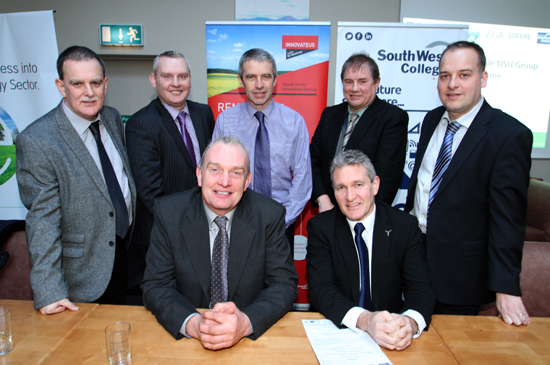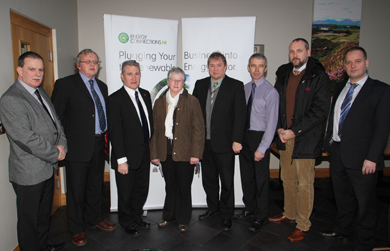A rural area to the South-East of Downpatrick has been chosen by various stakeholders as a suitable location for Northern Ireland’s ‘centre of excellence’ for ‘Energy Storage’… an energy hub.
A conference of stakeholders was held in Ardglass Golf Club in Tuesday 11 February 2014.
It is envisaged that a series of projects will be proposed, including an intelligent micro-grid demonstration project sponsored by a variety of economic and social partners in the Ardglass and Ballyhornan areas.
[caption id="attachment_47048" align="aligncenter" width="550"] Guest speakers and local political representatives at the Lecale DSU confererence held in Ardglass Golf Club. From left, back row, Sam Knox Invest NI, John McCallister MLA, Nicholas McCrickard, Country Down Rural Community Network, Down District Council Cllr Cadogan Enright, ADA member, John Harrison, South West College, and front row, Alan Montgomery, farmer and Down UFU, with David Surplus, Benign Energy director.[/caption]
Guest speakers and local political representatives at the Lecale DSU confererence held in Ardglass Golf Club. From left, back row, Sam Knox Invest NI, John McCallister MLA, Nicholas McCrickard, Country Down Rural Community Network, Down District Council Cllr Cadogan Enright, ADA member, John Harrison, South West College, and front row, Alan Montgomery, farmer and Down UFU, with David Surplus, Benign Energy director.[/caption]
Ardglass Development Association (ADA) is sponsoring the “Community Based Intelligent Energy Programme” which will bring forward a number of projects over the next few months. ADA are backed by Down District Farmers For Renewable Energy (DDFFRE). This is a UFU-backed group of farmers in Lecale seeking to diversify and develop their businesses into energy production.
To date, the energy project has attracted a £40,000 support from Invest NI and £5000 from the Down Rural Area Partnership, and it is hoped to attract a further £250,000 to bring thisproject further ahead in the near future. As this development has also an All-Ireland dimension, support too may be sought from Intertrade Ireland.
Councillor Cadogan Enright, working closely with ADA, said: “A number local businesses and renewable energy companies have committed to demonstrating how new technologies in renewable energy can be made to work on a remote location on the all-Island grid network without the expense involved in having to reinforce the existing infrastructure.
“This area, also known as Lecale, is typical of much of Northern Ireland. It has excellent potential for renewable energy resources that are limited by:
* The inability of the all-island grid to provide the necessary infrastructure to allow local businesses and landowners to connect at economically sustainable levels. Grid connection costs of £300,000 – 400,000 for small renewable energy generators of 250kW installed capacity are not uncommon and prevent local businesses from driving down business energy costs or diversifying their product lines. For example in November of 2013 a Lecale farmer was presented with a £450,000 bill to connect to the local grid – an impossible amount for a family farm. (Bernard Venny)
* The huge cost of upgrading the grid into rural areas can create local shortages of supply that have to be supplemented by ‘expensive to run’ diesel gensets. Many small local businesses run diesel gensets to provide power of their businesses. (eg Rossglass Hayledge)
* The periodic nature of renewable energy can sometimes create surplus when energy is not required by the grid, which unless managed correctly can cause curtailment of supply and lost revenue. This is likely to be an issue with the new off-shore windfarm.*
* Many local farmers involved in dairying, cereal-based food production and livestock production have high energy bills and cannot get adequate levels of renewable energy connected to the grid to defray their rising energy costs (Magees, Carsons).
[caption id="attachment_47049" align="alignleft" width="390"] Ardglass Dievelopment Association members Mary McCargo, chairperson, and Jeremy Bryce, with Councilllor Cadogan Enright pictured at the Lecale DSU conference in Ardglass Golf Club.[/caption]
Ardglass Dievelopment Association members Mary McCargo, chairperson, and Jeremy Bryce, with Councilllor Cadogan Enright pictured at the Lecale DSU conference in Ardglass Golf Club.[/caption]
“The Programme is based on the realization that the key to solving these energy problems is to create a community-level microgrid that can manage power flows at the local level. All-Island grid regulations describe such opportunities as ‘Demand Side Units’ (DSU’s).
“It is envisaged that because Lecale has an exceptional opportunity for renewable generation from a variety of resources, it represents and ideal test bed for system management technologies that can combine wind, solar, anaerobic digestion, energy storage, agricultural fertilizer production using the electrolysis of water and nitrogen n the air, and other alternative fuels, controllable loads in the form of water heating, Electric Vechicle (EV) charging, space heating, and other facets of demand side management,” explained Cllr Enright.
***
Lecale DSU – Northern Ireland’s first renewable energy micro-grid demonstration project
The Lecale micro-grid project is expected to be one of a series of projects in the Ardglass Development Association sponsored “Community Based Intelligent Energy Programme” which will bring forward a number of projects over the next few months associated with the ‘Lecale DSU project’.
The project has also been supported by Down Distict Farmers For Renewable Energy (DDFFRE). This is UFU-backed group of farmers in Lecale wanting to develop their businesses into energy production.
Additionally a number of renewable energy companies are associated with the programme of projects, providing technical expertise. Their interest centres around the possibility of creating commercial ways of storing renewable energy, thereby allowing the current target of 40% of energy in NI to be increased to 80% as is happening currently in Germany. This energy initiative also being run in Scotland may even inspire Stormont to to energy self-sufficency.
***
Ballyhornan May Be Centre For Green Technology Developments
The Bishopscourt airfield in Ballyhornan has been identified as the potential location for the ‘Centre of Excellence’ for the all-Island grid, and has attracted the interst of Invest NI to this project. The Residents Association in Ballyhornan recently hosted a workshop of Energy Companies, Farmers, Researchers and Invest NI at their Family Centre.
[caption id="attachment_47050" align="alignright" width="390"] At the Lecale DSU conference were Sam Knox, IFI, ADA members Jeremy Bryce and Mary McCargo, David Surplus, Benign Energy, Councillor Cadogan Enright, Nichals McCrickard, County Down Rural Community Network, Chris Osborne, UFU, and John Harrison, South West College.[/caption]
At the Lecale DSU conference were Sam Knox, IFI, ADA members Jeremy Bryce and Mary McCargo, David Surplus, Benign Energy, Councillor Cadogan Enright, Nichals McCrickard, County Down Rural Community Network, Chris Osborne, UFU, and John Harrison, South West College.[/caption]
It is envisaged that the The Lecale DSU would be based in Bishopscourt to demonstrate how a community-based 33kv rural electricity station can be reconfigured into an ‘energy island’ supplying energy to Urban Areas.
A DSU is a mechanism contained within the all-Island Single Electricity market regulations to allow third party participants to take on the responsibility of balancing electrical load and demand on the lower voltage (11kv) distribution networks. Several of these circuits radiate from the 33/11kv substation located at the Bishopsgate airfield which would be ideal for this purpose.
Several local businesses, landowners, DDFFRE, and several energy companies are jointly investigating how best to create a micro-grid based around that location. The micro-grid would trade renewable electricity to a local social housing development at lower prices thus potentially having an alleviating effect on fuel poverty in the region. Wind turbine curtailment would be reduced or avoided as would the cost of upgrading NIE lines.
The Aim of The Community Based Intelligent Energy Programme” is to create products and services that could be demonstrated at the community level that would be exportable across Europe. If such a scheme was proven successful in Northern Ireland, it could allow rural areas to become largely independent by managing and storing while selling energy when it was required to the grid for more urban areas.
It could be replicated across NI and the Republic through the all-island energy market and regulatory structures
This comprehensive energy project will likely involve:
* large wind turbines (2 x 2.5MW),
* small wind turbines (several 250kW),
* the Strangford Lough based Tidal Turbine,
* large solar (5.1MW ) fields,
* small solar (20kW roof and 50kW ground mounted) demand side management for 300 houses (Ballyhornan),
* AD (2 x 500kWe),
* ICAES (Isothermal Compressed Air Energy Storage),
* battery storage (with thousands of batteries),
* and EV charging and ammonia production for fertiliser (NB ammonia is a renewable fuel which could be made through electrolysis at low cost using ‘otherwise curtailed wind power’ combined with a ‘fee earning load-on-demand service’.
This model has the potential to be replicated to about 70 additional rural 33kV substations in NI and is equally applicable in the Republic of Ireland (part of SEM). Similar problems exist throughout the rest of the UK and it is expected that business models and opportunities will be developed that can be exported to these regions.
The Ardglass Development Association will sponsor a series of feasibility studies and market analyses to provide individual company partners with a roadmap that allows them to move forward with their service or product offering.
The Context of the Development
Northern Ireland is currently in a unique position relative to the rest of Europe, being the first market to face the commercial realities and multiple challenges of high density grid and problems with the integration of a high level of renewables. The result is that there is curtailment by the grid operator of producers who are grid-connected, and high levels of additional capacity awaiting connection.
The development of Demand Side Unit Infrastructure (renewable generation, controllable load, and energy storage) coupled with intelligent control system will enable better exploitation of renewable resources and maximise the utilisation of the existing infrastructure.
Northern Ireland has the opportunity to develop a leadership position and exploit first mover advantage to become an ‘early adopter’ commercial Reference Site for scalable solutions for international markets and to secure a share of the potential export revenue. This will allow exploitation of existing regional strengths whilst building a sustainable platform for the future development of next generation technologies and related intellectual assets and skills.
***
The Size Of The Market That Can Be Targetted
In February 2013, the Invest-NI sponsored MATRIX Sustainable Energy Horizon Panel Report was issued which ‘identified a compelling opportunity for Northern Ireland to take a leadership role in the development of distributed energy solutions and their integration into Intelligent Energy Systems through establishing itself as an International Reference Site to demonstrate the commercial scalability of these solutions to the global market, which is estimated to be worth £8 billion in 2018’.
At the same time it recognised that there are a significant number of farming businesses that offer the potential to act as nuclei for rural community-based projects. The Lecale DSU project will represent the first of these projects. Through this project the partners will seek to develop the blueprint for the construction of future community based Intelligent Energy Systems and develop the knowledge and skills to deliver market leading product and service offerings.
Further research has also indicated that grid connection issues are prevalent throughout the UK with many applicants receiving ‘soft grid offers’ where availability of grid connection cannot be guaranteed and developer must proceed at their own risk. This is making these project un-financeable unless alternative solutions can be put into practice.
The Ulster Farmers Union has conducted research that indicates that as many as 1000 single wind turbines within Northern Ireland may become stranded due to prohibitive grid connection costs. This represents up to £500m of investment into the local economy that cannot take place, representing lost revenues of £100m per annum. Development of this project will explore potential solutions to this problem and open up commercial pathways to allow this investment to proceed.
The UK government SENSE Energy Storage Network is currently investigating the potential for Energy Storage throughout world markets , especially in the Middle East, and will also be seeking projects to support in this space.
]]>























